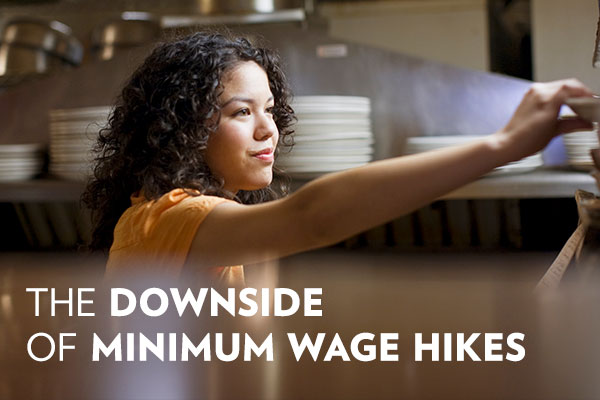Press Release

Economic Growth Boosts Prosperity, not Minimum Wage Hikes
November 20, 2019, Harrisburg, Pa. — Today, the Pennsylvania Senate passed legislation to hike the commonwealth’s minimum wage from $7.25 per hour to $9.50 per hour by 2022.
Commonwealth Foundation Vice President & COO Nathan Benefield issued the following statement along with a minimum wage fact sheet:
Economic growth spurred by the federal Tax Cuts and Jobs Act has been increasing wages for all workers, especially those at the lowest end of the pay scale. This should be our model to ensure all Pennsylvanians can pursue their dreams and earn success.
Any minimum wage hike will cut off access to work experience for those trying to enter or re-enter the workforce, such as teenagers and former inmates, halting economic progress in its tracks for many Pennsylvanians.
While Governor Wolf claims minimum wage increases will move people off of public assistance, there is no connection between increasing the minimum wage and poverty reduction. In fact, research found minimum wage increases exacerbate poverty and reliance on public assistance.
Instead of pushing counterproductive wage mandates, policymakers should focus on proven ways to boost economic opportunity for all, including enacting commonsense spending limits to prevent tax hikes, lowering Pennsylvania’s extreme corporate tax rate to promote job growth, and cutting licensing requirements so low-income earners can start their own businesses and control their own futures.
Below are highlights from a Commonwealth Foundation fact sheet detailing the consequences of a minimum wage increase. Click here to read the full version.
How many Pennsylvanians earn the minimum wage?
According to the U.S. Bureau of Labor Statistics, 45,000 people are earning exactly minimum wage. That 45,000 represents 1.3% of those with hourly pay, only 0.7% of all employees.
What is the impact of a minimum wage increase?
A recent IFO analysis estimates a $12 minimum wage would result in a raise for 1.08 million workers of $2,885 annually. This comes at a cost of 34,100 positions and annual wage reductions of $10,646 for those workers. It would also indirectly impact about 826,000 workers earning up to $15 an hour. Critically, the IFO assumes workers that retain their jobs do not see a significant cut in hours. But experience shows these workers often see dramatic reductions in hours and benefits.
Minimum wage hikes are short-sighted.
According to a study by University of California economists and the National Bureau of Economic research: “each $1 increase in the minimum wage has, in disadvantaged neighborhoods over the past three decades, increased poverty rates and the receipt of public assistance by roughly three percent.”
Wages are already rising for low-income workers.
Thanks to the Tax Cut and Jobs Act, along with a tight labor market, economists are noting wage growth is the strongest for workers in low-wage industries, such as clothing stores, supermarkets, amusement parks, and casinos. And even among that bottom half, the biggest gains are going to workers earning the least.
Gov. Wolf recognizes the burdens.
Gov. Wolf seems to acknowledge wage mandates are a burden. His mandated minimum wage increase for government workers did not include contracts with the Department of Human Services because, in his words, “we didn’t want to put additional burdens” on human services providers in the midst of the budget impasse.